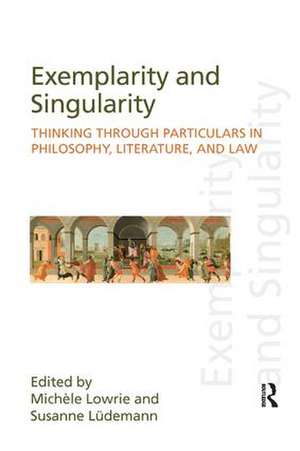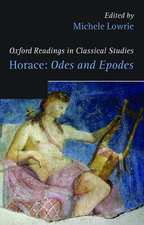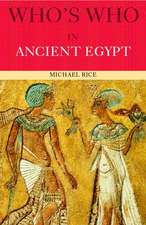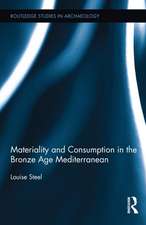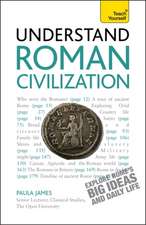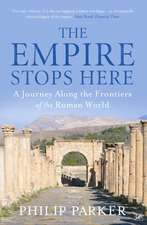Exemplarity and Singularity: Thinking through Particulars in Philosophy, Literature, and Law: Discourses of Law
Editat de Michele Lowrie, Susanne Lüdemannen Limba Engleză Paperback – 7 iun 2017
| Toate formatele și edițiile | Preț | Express |
|---|---|---|
| Paperback (1) | 469.34 lei 6-8 săpt. | |
| Taylor & Francis – 7 iun 2017 | 469.34 lei 6-8 săpt. | |
| Hardback (1) | 1054.75 lei 6-8 săpt. | |
| Taylor & Francis – 5 mai 2015 | 1054.75 lei 6-8 săpt. |
Din seria Discourses of Law
-
 Preț: 291.20 lei
Preț: 291.20 lei -
 Preț: 415.09 lei
Preț: 415.09 lei -
 Preț: 417.20 lei
Preț: 417.20 lei -
 Preț: 416.22 lei
Preț: 416.22 lei -
 Preț: 280.71 lei
Preț: 280.71 lei -
 Preț: 385.44 lei
Preț: 385.44 lei -
 Preț: 354.54 lei
Preț: 354.54 lei - 9%
 Preț: 935.68 lei
Preț: 935.68 lei -
 Preț: 389.60 lei
Preț: 389.60 lei -
 Preț: 408.03 lei
Preț: 408.03 lei -
 Preț: 387.49 lei
Preț: 387.49 lei - 16%
 Preț: 265.49 lei
Preț: 265.49 lei -
 Preț: 369.77 lei
Preț: 369.77 lei - 18%
 Preț: 1002.80 lei
Preț: 1002.80 lei -
 Preț: 482.17 lei
Preț: 482.17 lei - 18%
 Preț: 1118.99 lei
Preț: 1118.99 lei -
 Preț: 408.54 lei
Preț: 408.54 lei - 15%
 Preț: 323.46 lei
Preț: 323.46 lei -
 Preț: 372.67 lei
Preț: 372.67 lei -
 Preț: 439.41 lei
Preț: 439.41 lei -
 Preț: 469.34 lei
Preț: 469.34 lei -
 Preț: 395.04 lei
Preț: 395.04 lei - 22%
 Preț: 311.51 lei
Preț: 311.51 lei - 26%
 Preț: 850.37 lei
Preț: 850.37 lei -
 Preț: 381.59 lei
Preț: 381.59 lei -
 Preț: 414.32 lei
Preț: 414.32 lei -
 Preț: 445.89 lei
Preț: 445.89 lei
Preț: 469.34 lei
Nou
Puncte Express: 704
Preț estimativ în valută:
89.81€ • 94.02$ • 74.31£
89.81€ • 94.02$ • 74.31£
Carte tipărită la comandă
Livrare economică 05-19 aprilie
Preluare comenzi: 021 569.72.76
Specificații
ISBN-13: 9781138241749
ISBN-10: 1138241741
Pagini: 226
Dimensiuni: 156 x 234 x 14 mm
Greutate: 0.45 kg
Ediția:1
Editura: Taylor & Francis
Colecția Routledge
Seria Discourses of Law
Locul publicării:Oxford, United Kingdom
ISBN-10: 1138241741
Pagini: 226
Dimensiuni: 156 x 234 x 14 mm
Greutate: 0.45 kg
Ediția:1
Editura: Taylor & Francis
Colecția Routledge
Seria Discourses of Law
Locul publicării:Oxford, United Kingdom
Public țintă
Postgraduate and UndergraduateCuprins
1. Introduction: Michèle Lowrie and Susanne Lüdemann, I. The Practice of Theory: A Historical Reminder, 2. Hans Lipps, Instance, Example, Case, and the Relationship of the Legal Case to the Law, 3. Bernhard Waldenfels, For Example, 4. Anselm Haverkamp, Equivalence Unbalanced – Metaphor, Case, and Example – from Aristotle to Derrida, 5. Eva Geulen, Without Example: Adorno, II. The Roman Practice of Exemplarity, 6. Rebecca Langlands, Roman Exemplarity: Mediating between General and Particular, 7. Matthew Roller, Between Unique and Typical: Senecan Exempla in a List, 8. Melanie Möller, Exemplum and Exceptio: Building Blocks for a Rhetorical Theory of the Exceptional Case, 9. Clifford Ando, Exemplum, Analogy, and Precedent in Roman Law, 10. John P. McCormick, Machiavelli’s Agathocles: From Criminal Example to Princely Exemplum, III. Exemplarity / Singularity, 11. Peter Goodrich, The Exampleless Example: Of the Infinite Particularities of Early Modern Common Law, 12. Christiane Frey, Bacon’s Bee: the Physiognomy of the Singular, 13. David Martyn, The Temper of Exemplarity: Werther’s Horse, 14. Robert Morrissey, Stendhal: Julien Sorel in the Footsteps of Napoleon, 15. Paul Fleming, Beside Oneself: Parapraxis as a Paradigm of Everyday Life (Freud)
Descriere
This book identifies and follows a strand in the history of thought – ranging from codified statutes to looser social expectations – that uses particulars, and more specifically examples, to produce norms. Much intellectual history takes ancient Greece as a point of departure. But the strand of thought followed here finds its home, if not its origin, in Rome. The practice of exemplarity is historically rooted firmly in ancient Roman rhetoric, oratory, literature, and law, genres that also secured its transmission. Tracing the role of exemplarity from Rome through to its influence on literature, politics, philosophy, psychoanalysis and law, it shows how Roman exemplarity has subsisted, not only as a figure of thought, but also as an alternative way to organize and to transmit knowledge.
